IPE: Interprofessional Education
The MAAETC Interprofessional Education (IPE) programs are strategically designed to foster early interest in HIV care among future healthcare professionals. This proactive approach aims to improve outcomes across the HIV care continuum by engaging students in collaborative, interdisciplinary learning experiences. These programs help build the skills and competencies required for effective team-based HIV care, ultimately strengthening the healthcare workforce and improving care quality and outcomes for individuals living with HIV.
The IPE initiative is currently centered at the University of Maryland, Baltimore (UMB), our Local Partner Site (LPS), and will remain so for the five-year duration of this grant. In subsequent years, Virginia Commonwealth University (Year 2) and Howard University (Year 4) will join the initiative, expanding its regional reach and impact.
IPE Model and Approach
MAAETC’s IPE model emphasizes teamwork, communication, and ethical practice—core components of effective interprofessional collaboration. This includes fostering trust, integrity, and mutual respect among team members. Practicing clinicians must develop sustainable changes in care delivery that leverage the full scope of their professional roles, reduce costs, and improve patient outcomes. This transformation—from fragmented to integrated care—requires a coordinated, team-based approach.
The Institute of Medicine (IOM) supports the integration of interprofessional models to improve health outcomes, reduce costs, and enhance patient satisfaction. According to the IOM, interprofessional teamwork involves professionals from diverse disciplines working collaboratively with a shared team identity to solve problems and deliver integrated care. This model is especially vital as healthcare systems face workforce shortages—exacerbated by the COVID-19 pandemic—and increased need in underserved areas and populations.
Preparing the Future Project & Faculty Institute
The IPE project follows a cohort model in which faculty from various health and social service professional schools are trained to deliver a specifically developed HIV/IPE curriculum. The Preparing the Future Project, based at UMB, will serve as a replicable model for additional IPE programs at VCU, Howard University, and a virtual Faculty Institute.
The Faculty Institute will deliver IPE across USPHS Region 3, with a curriculum focused on:
-
Values and ethics for interprofessional practice
-
Roles and responsibilities
-
Interprofessional communication
-
Teamwork and collaborative care
Curriculum and Experiential Learning
The IPE curriculum integrates key content areas—referred to as curriculum “threads”—including:
-
HIV prevention and care
- PrEP and adherence strategies
Experiential learning activities include:
-
Simulation-based training scenarios
-
Interprofessional (IP) discussions
-
Clinical teaching
-
Problem-based learning
-
Structured observation and debriefing with standardized patients
These activities aim to equip faculty with teaching skills for didactic sessions, small group facilitation, simulation-based instruction, and clinical preceptorship.
Faculty trained through this model will educate students to work effectively in interprofessional HIV care teams. They will guide students in patient-centered care planning using reflective and team-based approaches.
Institutional Change and Sustainability
The IPE initiative aims to drive institutional-level change by:
-
Embedding interprofessional learning into curricula
-
Supporting policy integration and program development
-
Promoting collaboration and communication among professional schools
Faculty will be supported in curriculum design and implementation through curriculum mapping and continuous evaluation. Regular updates will ensure relevance and responsiveness to emerging needs, particularly around HIV-related syndemics.
The project emphasizes development of core team characteristics, such as:
-
Clear roles and responsibilities
-
Faculty mentorship and leadership
-
Mutual trust and shared mission
-
Team norms and expectations
-
Reflection, feedback, and a supportive organizational environment
Service-Learning and Regional Dissemination
Each participating LPS will implement a service-learning component, guided by faculty mentors. These components will include:
-
Clinical observation
-
Simulation-based learning
-
Structured interviews and case reviews
-
Use of regional simulation labs and clinical data
These activities support sustainable practice change by immersing students in real-world interprofessional HIV care environments.
Impact and Integration
The participating LPSs bring substantial experience and capacity in IPE. This collaborative infrastructure:
-
Increases access to resources
-
Enhances dissemination and reach
-
Builds on existing expertise
-
Improves cost-effectiveness
By investing in faculty development and curriculum innovation, the IPE project ensures a pipeline of skilled, collaborative providers equipped to deliver high-quality, integrated HIV care across the region.



